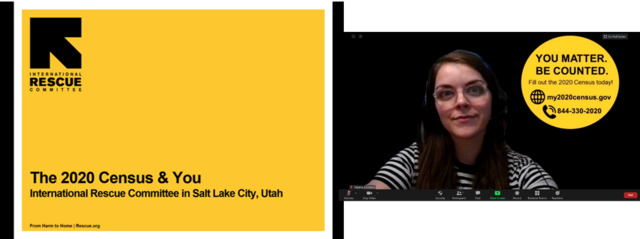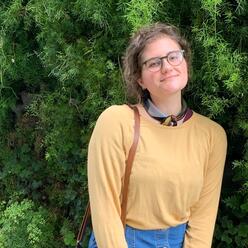
The United State Census only comes once a decade. It’s a landmark in time that decides where resources will be allocated based on the concentration of people in an area. Between access to schools, hospitals and other vital programs, much will be at stake. This is why Tatjana Andrews, the civic & community engagement coordinator at the International Rescue Committee (IRC) in Salt Lake City, needed to rethink how to engage refugees in the census.
A few months ago, Tatjana had a plan for teaching refugees about the 2020 Census and helping them to complete it. Physical distancing following COVID-19 meant she had to radically shift her approach to census education. She had to pivot from her intended drop-in day where refugees could come for assistance with a volunteer. Now, Tatjana and a small group of volunteers are going to refugees. A few weeks into their revised census assistance, Tatjana is working with volunteers to make phone calls to update refugee families on the 2020 Census in addition to creating a number of accessible educational resources for refugees.
“I create these things for myself,” Tatjana said of these resources, which includes an instructional video. She imagines what would engage her, questioning “what gets complicated and makes people not want to participate.” For the first time, the census is available online, which can help simplify the process. Having the census online increases its accessibility, but only for those who know where to look.
Tatjana, a former refugee herself from Bosnia, didn’t see a lot of emphasis placed on politics in her household growing up. Last year, though, Tatjana began to use her voice to advocate for refugees in Washington D.C. After that, the IRC in Salt Lake City acquired a small grant to help Tatjana move into her current position with a goal of supporting refugees as they participate in the 2020 Census and breaking down barriers to the voting process.
“Then I snuck my way into this,” she said of her current position, one that didn’t exist until 2020.
This unprecedented position came together in the middle of unprecedented times. “The plan is not to get back to normal but adapt to the new normal,” Tatjana said. She and her team of volunteers have been using Podio, an online program where they can track which people still need to be reached. She and the volunteers check in every Friday to update each other on progress.

One of these four outstanding volunteers is Caitlin Silianoff. “There’s no means of demonstration,” she said, referring to their new virtual means of communication. On the other hand, she observed that they now have a wider reach over the phone. The census has long been of interest to her since old records reveal so much history. Her appreciation for it has only grown. “This is going to have a huge impact,” she said. “The data stays intact for a long time and determines the overall welfare of what our community is for the next decade going to benefit from.”
“It feels really gratifying when resources line up with needs,” Caitlin said. She loves when a refugee tells her “thanks, we filled it out.”
Despite the obstacles, Tatjana and the volunteers have been able to assist refugees with completing the census through multiple means. These efforts help create a more accurate representation of the community we live in so that refugees can be equally seen and supported.
Do your part to help ensure an accurate count in the 2020 Census and further support our community. Fill out the census and encourage those around you to do the same: 2020census.gov